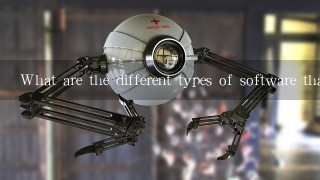What are the different types of software that robots use?

Types of Software for Robots
1. Control Software
- Responsible for the robot's movement, manipulation, and behavior.
- Includes algorithms and instructions that tell the robot how to perform tasks.
- Examples: ROS (Robot Operating System), Unity, and Choregraphe.
2. Perception Software
- Allows the robot to gather and understand its surroundings.
- Includes sensors, cameras, and other devices that provide visual, auditory, and tactile information.
- Examples: OpenCV (Open Source Computer Vision Library), Lidar, and Sonar.
3. Planning Software
- Plans the robot's path and actions.
- Uses algorithms to determine the best sequence of steps to achieve a goal.
- Examples: A* search, Breadth-First Search, and Informed Search.
4. Learning Software
- Allows the robot to learn new skills and adapt to changing environments.
- Includes machine learning algorithms that enable the robot to identify patterns, make predictions, and improve its performance.
- Examples: Deep learning, reinforcement learning, and natural language processing.
5. Communication Software
- Enables the robot to interact with humans and other devices.
- Includes speech recognition, natural language processing, and remote control protocols.
- Examples: ROS, TCP/IP, and Bluetooth.
6. Simulation Software
- Provides a virtual environment for testing and training.
- Allows the robot to practice tasks in a safe and controlled environment.
- Examples: Unity, Unreal Engine, and Simulink.
7. Data Management Software
- Stores and manages the robot's data.
- Includes databases, file systems, and data analysis tools.
- Examples: MySQL, MongoDB, and Apache Spark.
8. Middleware Software
- Acts as a bridge between different software components.
- Provides communication and data exchange between robots and external systems.
- Examples: Apache Kafka, RabbitMQ, and NodeJS.



























































